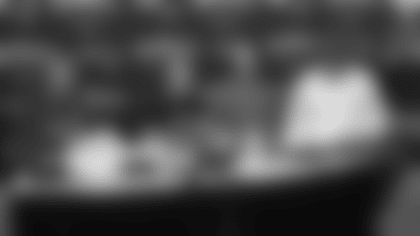New England Patriots defensive coordinator Dean Pees addresses the media during his press conference at Gillette Stadium on Friday, October 31, 2008.
Q: The Colts are always a tough challenge. Can you talk about what you've seen in them this year?
DP: I see the same thing I've always seen from the Colts. It's not a lot different this year. They've got so many weapons in Reggie Wayne, [Marvin] Harrison, [Dallas] Clark, and [Anthony] Gonzalez and they can run the ball. This is an explosive offense and some of the things that they have maybe missed on this year they've missed maybe by inches, where maybe a year ago or something they caught a same pass and this year it's been off by inches. But I see the same explosive offense and they've just got a lot of people to defend; that's always been the problem with them. It's not so much that you get multiple formations and all this kind of stuff like some of the teams you play against where you've just got all these different looks and every week it's going to be something different. They do what they do and they do it very well.
Q: Generally, have you seen the Colts using three receivers and putting Anthony Gonzalez in as the third?
DP: They're doing just as much two tight end personnel as they do three wide receiver personnel. It's pretty balanced when you really look at it overall. I'm sure they have certain weeks against certain teams-it's just like us on defense. There're certain weeks we play a lot of nickel, some weeks we don't play any nickel, some weeks we play 3-4, some weeks we play 4-3. Some weeks they'll play with two tight ends and two receivers, sometimes they'll do it with three wides. I'm sure they're just trying to get match-ups. I don't have the answer for why they do it. It's just that you have to be able to defend both of them because you're going to see them both. Some games in the past we've seen a lot of two tight ends, two receivers and then other times we've seen the other. The formations and all that don't change; it's the personnel that changes. You've just got to be able to deal with it.
Q: How is the working relationship/ communication between James Sanders and Brandon Meriweather different than it was between James Sanders and Rodney Harrison?
DP: I don't know. That would be something I think you would have to ask them, if there's any personal thing they think is different [like] communication. I don't see it as being anything different from a coaching standpoint because both safeties have to communicate. We don't put it all on one guy to make all the calls and control everything. It's both of them. They both have to make the calls. They both have to echo it to each other and to the corners. They're both held responsible for it. Just in the meetings and in practice and stuff, I didn't see it as any different if it was Rodney and Brandon, Brandon and James, James and Rodney. I didn't see a whole lot of difference and hope there isn't any difference.
Q: How much more vocal or sure of himself is Brandon Meriweather this year?
DP: I think anybody becomes more vocal the more they understand the scheme and what you're trying to get accomplished. Yeah, he's certainly more vocal than he was as a rookie and I would hope every week he gets more and more so, with the more things that he sees and the more her understands not only our scheme, but he just understands what the other team is trying to do. So it has definitely improved from a year ago.
Q: You've talked about eliminating the big play. Another one came up last week, so can you go back to that?
DP: I'm going to go back to Denver where there were no big plays. I'm going back and making a point the other way. There were no big plays in the Denver game. The longest pass was 20 yards and look at the result. So rather than going on the negative side of it, I'm going to go on the positive side of it and show that was a great example to tell the defense there were no big plays and basically they scored a touchdown at the end of the game. Last week was the same thing. We, statistically, for 58 plays, played better last week against the Rams than we did against Denver. And yet it didn't look like it and you don't feel like it at the end of the game because-I don't remember how many points we gave up, what was it 16 or something like that-where the week before it was seven. But again it was four plays, so we're going to keep harping on it and emphasizing that big plays are something that you just can't [give up]. If you do it against Indianapolis, it's going to be death. You cannot give up big plays against them. They get them and we've got to try to prevent them.
Q: (On the St. Louis Rams 69 yard touchdown to Donnie Avery...)
DP: When James knocked off Ellis on the tackle? First of all, what had happened was the safety kind of bit a little bit on the over route. They ran an over route and a post in behind it, which is tough on a three-deep because it kind of draws the safety on the over route. The thing is we were in man coverage, bump and run, actually, on that one, which we weren't in a lot, but we were in that one. The guy beat Ellis a little bit on the release and got on top of him, and that's where you hope maybe the safety can give you some help on that. It was a combination of both, really. The other thing is if we had just made the tackle, who knows what would have happened. Again, I gave an example of early in the game they threw a pass that we had a problem with [and] they got down to like the seven yard line. Jonathan Wilhite went airborne to make the tackle and we held them out the first time down there in the red area, so they came away with three points. It's kind of the same way on that play. Yeah, we gave up a big play, but had we just made the tackle, who knows, we might have been able to hold them there in the red area. That's where you just can't do it. That was the thing that killed us in San Diego, going all the way back there was, it wasn't only a big play, it was a big play for a touchdown. A big play is one thing. We gave up one against Kansas City, remember, and then we held them in the red area. We've got to secure the tackle. But on that particular play they got us in man coverage and it was a good route and the safety bit a little bit and they knocked each other off.
Q: Was that straight man?
DP: It was cover-one. We had a middle of the field safety. Yeah, he didn't really come underneath. He actually went across the field. He came deep to try to draw the free safety. If he comes underneath, it doesn't do anything, doesn't affect the safety. He came deep at about 15 to 20 yards which kind of draws the safety seeing him run across. Then they bring another guy about 25 yards behind that one. We didn't play it as well as we should have.
Q: On the stats sheet Anthony Gonzalez has trumped Marvin Harrison. How much have you seen him develop in the past year?
DP: I think that's maybe a little misleading, too. I would still say Harrison is right up there. I don't know that he's still the third receiver. It may be the case in receptions and stuff like that, but I think when you look back at big plays and things like that, Harrison is still right up there on the big plays, and you get down to the red area and he's still doing a lot of things. I've read a lot of things about him that I don't see. He's still really, really a great player. Gonzalez is getting better. It's just like asking the question on Brandon [Meriweather]; a guy is always going to get better in his second year or third year and just keep developing. He's going to be just a better receiver, reading coverages, doing all those things all the time within their system. He's a good match for what they do. He's a good receiver. They all are weapons, really it's hard. You just can't double everybody, you just can't. That's what makes them a good offense.
Q: Before Denver, Bill Belichick said Denver makes you cover the whole field. Is that how Indianapolis is?
DP: Yeah, it is. Maybe even more so with Indy. The fact that-I think I've stated it once before-there're some quarterbacks that can make some throws. Not every quarterback can make every throw. Some guys can't throw a 20-yard comeback, so they're going to dump the ball down inside, dump the ball off to the backs, timing routes, things like that. They can't just gun it in there. There are some quarterbacks that do nothing but just gun it in there, stare the receiver down and try to rely on their arm. The problem is with [Peyton] Manning is he is all of the above. He can throw a 20-yard comeback. He can put touch on it in the seam. He's thrown some passes-he threw one, I still remember, against us up there two years ago that was a seven-route, post-corner route, that the guy was catching it just as his foot was stepping right on the sideline and it was a rope. You didn't even realize-it wasn't like it was John Elway standing back there and you could just see how strong his arm was. It was just a tight spiral. This guy can throw every route, so you talk about stretching the field, this team can stretch the field better than anybody. Denver does it because of scheme; this [team] can do it because of the quarterback. He's a great quarterback, he really is.
Q: I don't know if you're aware that Jerod Mayo was name the NFL defensive rookie of the month yesterday.
DP: Nope. Don't tell him.
Q: As a veteran coach, can you tell us a little bit about him behind the scenes and what has helped him come into the NFL and be so productive?
DP: I'd say two things. Number one, I think he works very hard off the field as much as he does on the field. To me, that's the biggest part of being a total football player and total package: not just relying on your talent, but relying on your head and your talent and working hard off the field in the meetings, in the classroom and all that kind of stuff and studying and trying to get better and really trying to understand and be coached and take coaching. He does that very, very well. The second part of it is I think he also, as a rookie, has done a very good job of being with the right guys like [Tedy] Bruschi, and [Mike] Vrabel and Adalius [Thomas] and all of those guys and listening to what they have to say. Not having the answers, but just being quiet and listening to what they [say], because you've got a bunch of good, smart, experienced players around you. Don't think you've got all the answers, and he doesn't. I think he does a great job of listening to those guys and trying to become better and getting advice from them and watching how they play. I think the guy has done a real good job like that. I've been around guys who have all the answers, and he's not that way. He listens to the people he needs to listen to.
Q: I suppose with the higher salaries today, it makes it easier for guys to think they know everything?
DP: I don't know. I just take it from player to player. I'd just say there are some players that come in with an attitude that 'I already know what I'm doing' and usually those guys don't succeed very well. And there are guys that come in and say 'I'm going to listen to the guys that know what they're doing and take coaching'. I'll use me as an example. I coached 32 years before I came here. And when I walked into that linebacker room the first time and saw Roman Pfeiffer, Ted Johnson, Willie McGuinness, Ted Bruschi and Mike Vrabel, I said, 'you know, even though I've been coaching for 32 years I'm going to just shut up and listen to what these guys have to say about linebacker play, rather than me'. I'm not going to come in and say 'Tedy, here's how you ought to be playing Mike linebacker.' Maybe I ought to listen to how he's been playing Mike linebacker. So I don't care how long you've played or how much money you're making, you can always learn from somebody.
Q: How important is this week for Terrence Wheatley and Jonathan Wilhite?
DP: I think it's important we win. I think it's important in the development when you win. I have the utmost confidence in anyone we put on the field. And the guys are just going to have to go out and play and we're going to see how they perform and how they follow the game plan and how they do. We're facing a great offense. They know it's a great offense, but we've faced somebody good almost every week. Those guys last week were pretty doggone good, too. You've just got to go week to week and just keep developing every week.












































